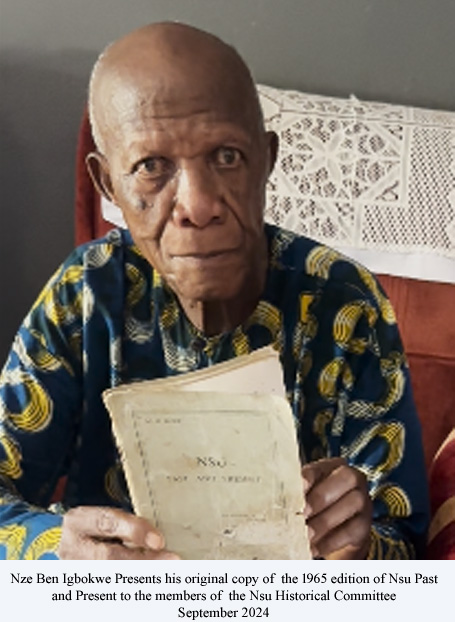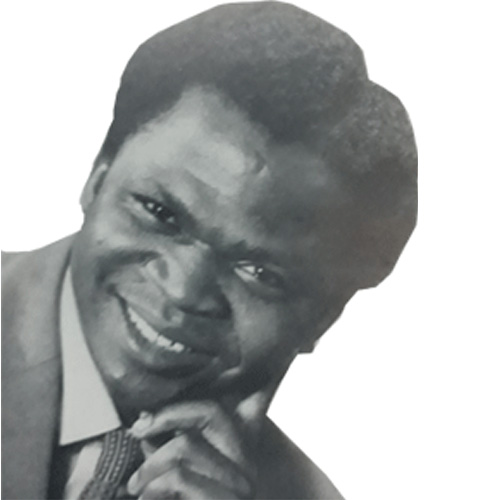Inaugural Address 1963
By Martin Ohaeri Ijere (Editor and Chairman Nsu Historical Committee
1963 )
Ladies and Gentlemen
I am delighted to Welcome you as members of Nsu Historical Committee to
this first general meeting. It is a great privilege to be called upon to write the
history of one's town or country, and those of us who find ourselves here
today are rarely honoured, For the opportunity to render service is in itself
satisfying as well as rewarding
Furthermore, it Is a good thing to see a group of young people coming
forward to THINK. The art of thinking is a most difficult thing. For that reason,
many people go about their daily routines with very little thought or at the
direction of others. Once young people like you begin to think of
themselves, their nation and its problems, then it is safe to say that their
salvation is at hand. It is taken that progress begins.
May I congratulate you therefore, who have answered my call to think and
wish that our co-operative efforts will produce results worthy of happiness
and honour to our people.
The task: You are called upon to undertake a study of your town Nsu and
record your investigations in such a form as to enable others to understand
and to appreciate it. You are called upon to think of those things existing
about you, the things you have lived through or experienced, and the
factors influencing development.
“Nsu -past and present”’ is a compendious term to include many
branches of investigations. We shall deal with history pure and simple, the
origin and migration of the people, their wars and their causes, people's
settlements and contact with other neighbouring towns.
It is sociological. What is the position of men , their relationship to
one another, their fictions and adjustments, their laws and customs,
authority and its operation; problems of population, crimes, urbanization
and social psychology?
The study is also political. we must be able to show the origin and
application of power in the society, the government of the family, clan and
tribe; the functions of those who govern and how they derive their authority,
the place of councils and role of councilor and the various changes in
administration?
It has something also to do with religion. what are the people's
forms of worship, traditional and otherwise? Who officiated and how? What is
influence of the various religion on the life of the people and their attitude
to work, commerce and recreation? These and many more are the
question we must answer.
The investigation embraces also the economic condition of the
people how they have tried to satisfy their many want with the scarce
resource available to them their occupation and technique of production
Iand the effectiveness of the land, labour and capital among them from
time immemorial and what prospects do they offer now?
We shall describe too the the geographical situation of the town size,
situation, nature of soil, river and stream and modes of transportation.
It is difficult to deal with the various aspect of our study now. We need
to approach the matter later, item by item. As you can see, many thing
influence our lives, which may be geographical, economic, social, religious,
political, sociological and psychological. These cannot be studied in
isolation. We need to see the relationship and inter relationship between
them to understand them well.
Qualities required:
The qualities required for writing for writing the above are those of a good
historian. They include selectiveness. There are many things that will present
themselves during ones investigation. But one must endeavour to select, out
of multitude of facts those ones thinks are useful in a particular instance.
Furthermore, the investigator must have a statistical mind. To avoid vague
generalizations, he should be able to ask the questions, how representative,
how large, how small? And as far as possible try to compare and contrast
with giving situations elsewhere.
We expect also that the person must be one, who understands men, is able
to work with them, has sympathy, patience, and perseverance.
He must be able to speak their language or appreciate what they say, and
make allowances for their idiosyncrasies.
The historian must be able to present the facts without coloring or
exaggeration or bias. His language must be clear, precise and pointed.
Superfluous words should be avoided as much as possible as they tend to
obscure rather than clarify the description.
Conclusion:
Our task as you can see is not an easy one, but which if well accomplished
will be really worthwhile. We need to produce a book that is readable and
informative. The wealth of knowledge it contains shall be result of the pooling
of our ideas and efforts. It is hoped that this will be a monumental which our
people and others will turn to each time they want to know something about
the town. It is necessary therefore to acquaint the ordinary people with our
work and the reasons for our questions as well as what we intend to with the
answers.
In all these, I wish you success.
Martin Ohaeri Ijere
Editor and Chairman
Nsu Historical Committee
1963 Ladies and Gentlemen
I am delighted to Welcome you as members of Nsu Historical Committee to
this first general meeting. It is a great privilege to be called upon to write the
history of one's town or country, and those of us who find ourselves here
today are rarely honoured, For the opportunity to render service is in itself
satisfying as well as rewarding
Furthermore, it Is a good thing to see a group of young people coming
forward to THINK. The art of thinking is a most difficult thing. For that reason,
many people go about their daily routines with very little thought or at the
direction of others. Once young people like you begin to think of
themselves, their nation and its problems, then it is safe to say that their
salvation is at hand. It is taken that progress begins.
May I congratulate you therefore, who have answered my call to think and
wish that our co-operative efforts will produce results worthy of happiness
and honour to our people.
The task: You are called upon to undertake a study of your town Nsu and
record your investigations in such a form as to enable others to understand
and to appreciate it. You are called upon to think of those things existing
about you, the things you have lived through or experienced, and the
factors influencing development.
“Nsu -past and present”’ is a compendious term to include many
branches of investigations. We shall deal with history pure and simple, the
origin and migration of the people, their wars and their causes, people's
settlements and contact with other neighbouring towns.
It is sociological. What is the position of men , their relationship to
one another, their fictions and adjustments, their laws and customs,
authority and its operation; problems of population, crimes, urbanization
and social psychology?
The study is also political. we must be able to show the origin and
application of power in the society, the government of the family, clan and
tribe; the functions of those who govern and how they derive their authority,
the place of councils and role of councilor and the various changes in
administration?
It has something also to do with religion. what are the people's
forms of worship, traditional and otherwise? Who officiated and how? What is
influence of the various religion on the life of the people and their attitude
to work, commerce and recreation? These and many more are the
question we must answer.
The investigation embraces also the economic condition of the
people how they have tried to satisfy their many want with the scarce
resource available to them their occupation and technique of production
Iand the effectiveness of the land, labour and capital among them from
time immemorial and what prospects do they offer now?
We shall describe too the the geographical situation of the town size,
situation, nature of soil, river and stream and modes of transportation.
It is difficult to deal with the various aspect of our study now. We need
to approach the matter later, item by item. As you can see, many thing
influence our lives, which may be geographical, economic, social, religious,
political, sociological and psychological. These cannot be studied in
isolation. We need to see the relationship and inter relationship between
them to understand them well.
Qualities required:
The qualities required for writing for writing the above are those of a good
historian. They include selectiveness. There are many things that will present
themselves during ones investigation. But one must endeavour to select, out
of multitude of facts those ones thinks are useful in a particular instance.
Furthermore, the investigator must have a statistical mind. To avoid vague
generalizations, he should be able to ask the questions, how representative,
how large, how small? And as far as possible try to compare and contrast
with giving situations elsewhere.
We expect also that the person must be one, who understands men, is able
to work with them, has sympathy, patience, and perseverance.
He must be able to speak their language or appreciate what they say, and
make allowances for their idiosyncrasies.
The historian must be able to present the facts without coloring or
exaggeration or bias. His language must be clear, precise and pointed.
Superfluous words should be avoided as much as possible as they tend to
obscure rather than clarify the description.
Conclusion:
Our task as you can see is not an easy one, but which if well accomplished
will be really worthwhile. We need to produce a book that is readable and
informative. The wealth of knowledge it contains shall be result of the pooling
of our ideas and efforts. It is hoped that this will be a monumental which our
people and others will turn to each time they want to know something about
the town. It is necessary therefore to acquaint the ordinary people with our
work and the reasons for our questions as well as what we intend to with the
answers.
In all these, I wish you success.
Martin Ohaeri Ijere
(Editor and Chairman Nsu Historical Committee 1963)

